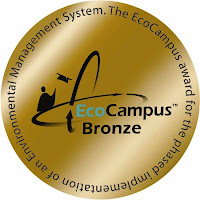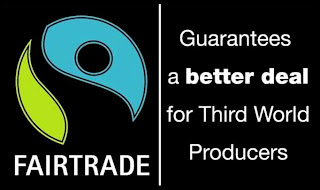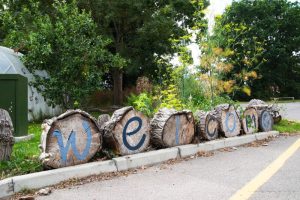Tuesday saw the launch of the second year of the University’s Green Impact project and Sustainability Champions Network. The project brings together sustainability champions from nearly every department within the University to complete a workbook-full of tasks set to improve the University’s environmental performance.
| John tries to explain how much bigger the new workbook is |
There are a lot of new sustainability champions joining the network this year bringing the total number of staff members implementing the Green Impact workbook to over 40. The champions will be trying to earn their department either Bronze, Silver, Gold or Platinum awards before they hand the workbooks in before Easter next year. Joining the various schools and offices in the University taking part in the scheme will also be Hadlow College – one of the University’s partner colleges that is working to reduce their carbon footprint and looking for new initiatives to do this. Sue Brimlow the college’s Sustainability Manager joined us for the event to find out what they could gain from working with Greenwich on implementing Green Impact workbook at Hadlow.
Kat Thorne – Head of Sustainability for the University kicked of proceedings by giving us an overview of sustainability at the University and how the global issues of population growth and increased demand on resources are impacting on the university. This was followed by highlighting some of the key areas of the Sustainability Policy and how the University was implementing them plus emphasising some of the key areas the Sustainability Team will be working on over the next 12 months.
Following Kat was David Young, one of the sustainability champions for IT at the Greenwich campus and self-titled ‘University of Greenwich Quiz Master’ – who’d put together an interactive quiz (Who Wants to be a Millionaire style) just to make sure the sustainability champions were listening to Kat’s speech. Despite a few iffy answers we are pleased to announce that the vast majority got the answers correct. Following the quiz John Bailey the Sustainability Projects Officer for the University went on to explain a few of the ins and outs of how the sustainability champions network works and how the new champions could expect to be communicating the sustainability message across the university.
Charlotte Taylor followed up giving us a national perspective on the NUS Green Impact scheme and showed how it had grown from being a pilot project at Bristol University to being taken up by 48 different universities for this academic year. At the University of Greenwich the sustainability champions completed 561 tasks through the Green Impact scheme and this fantastic number is being repeated all around the country with nearly 4,000 people directly involved and 19,620 tasks completed across the 35 universities that took part last year! That’s a great achievement and just goes to show how we are not alone fighting the sustainability corner but part of a much larger positive movement taking place nationwide!
| Neil demonstrates a hire bike Brompton folding away |
As well as Neil Garrod giving the champions a sneak preview of the University’s proposed Brompton bike hire scheme (complete with a slick demonstration of how to fold a Brompton bike as if trained by Mr. Brompton himself) he talked about how he’d recently gone back to look at the book on ‘nudge theory’ after recently surfacing on the government’s agenda. He mentioned how the nudge theory applied to the work that the champions are doing across the University and would be key to successfully embedding the behaviour change that is needed in order for the University to achieve its sustainability goals.
Neil has been championing sustainability for over 20 years and cited an example about being viewed as a lone nut while working at a previous university where he tried to bring sustainability onto the agenda through the medium of recycled toilet paper. Neil has seen a change in the support from senior management at the University of Greenwich; he used to be the only one championing sustainability with others claiming that sustainability was not a priority. He now finds himself in the opposite situation with those who used to claim that sustainability is not a priority now championing sustainability themselves. The University’s high score in the People and Planet Green League and the potential savings shown in the carbon management plan have swayed the senior managers and explained to the sustainability champions that they need to understand what sustainability means to those they work with and appeal to their colleagues’ individual agendas.
| Graeme Collie explains the culinary delights on offer |
After the morning’s speeches and presentations we were delighted with a sustainable hospitality menu from the university’s caterers ABM Catering. Graeme Collie from ABM explained how the menu had made best use of local, seasonal, organic and free-range or high welfare ingredients and that they were work
ing towards achieving a Silver Food for Life Award after implementing so many positive changes to the menus.
| John Bisbrown explaining the results from the first workshop |
| Sustainability champions discussing some of the challenges ahead |
The afternoon was packed full of workshops focused on challenging areas in the workbook and gave the champions a chance to work together to find a practical and pragmatic way of implementing some of the tasks. There was a strong focus on communication – as ever with sustainability – half the task is in how you communicate to your colleagues and win them over to the new practices and behaviours you are trying to implement. Positivity is a key message and focus for sustainability communications and is often far more effective than pedalling the doom and gloom stories. The Green Impact project and the Sustainability Policy and strategy are starting the move towards creating a more efficient university that creates a net positive impact. We finished the workshops with a great video from TED on how to start a movement in less than three minutes and how ‘a lone nut can become a leader’.
http://video.ted.com/assets/player/swf/EmbedPlayer.swf











